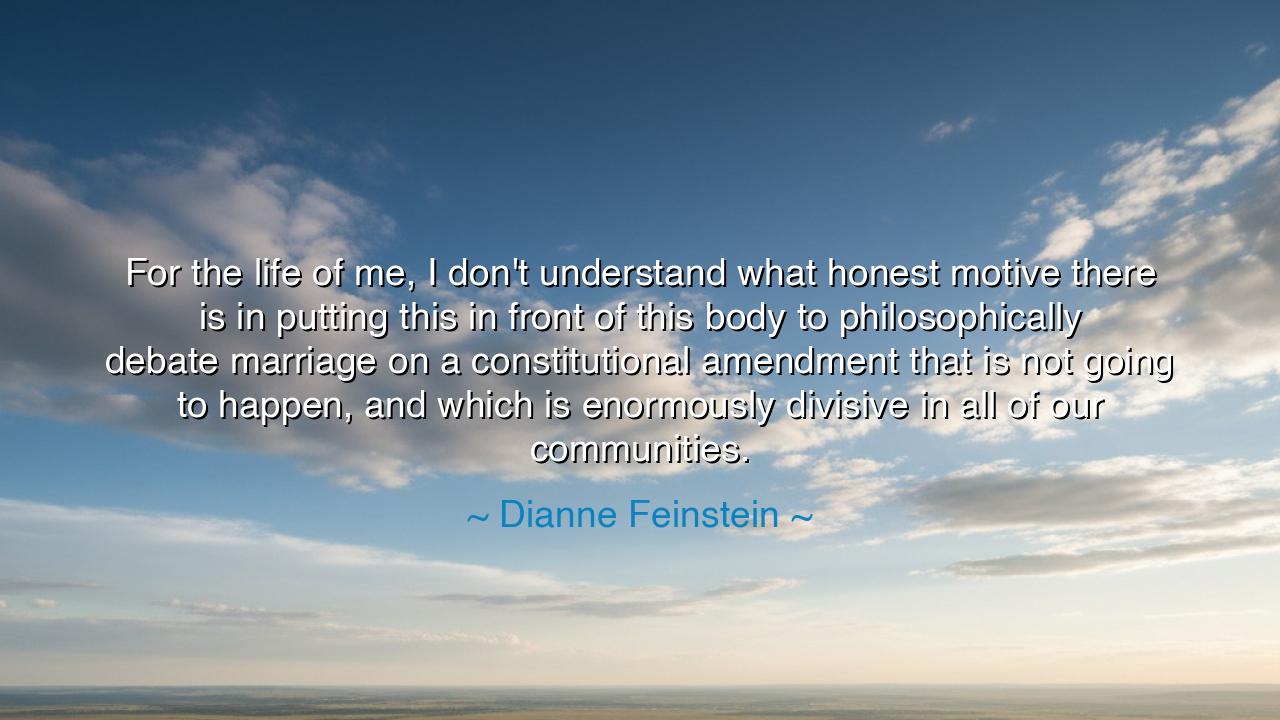
For the life of me, I don't understand what honest motive there
For the life of me, I don't understand what honest motive there is in putting this in front of this body to philosophically debate marriage on a constitutional amendment that is not going to happen, and which is enormously divisive in all of our communities.






When Dianne Feinstein declared, “For the life of me, I don't understand what honest motive there is in putting this in front of this body to philosophically debate marriage on a constitutional amendment that is not going to happen, and which is enormously divisive in all of our communities,” she was speaking from the weary wisdom of one who had seen the machinery of politics twist noble ideas into instruments of division. Her words are not the cry of a partisan, but the lament of a stateswoman — one who sees how power, when stripped of purpose, corrodes the harmony of a nation. In this single moment, Feinstein gave voice to an eternal truth: that to use sacred institutions as battlegrounds for ideology is to wound the very people one claims to serve.
The context of her words lies in a time of deep contention in American politics — when debates about marriage equality were carried not with humility and compassion, but with the weaponry of rhetoric. Feinstein, long a figure of measured judgment, watched as lawmakers sought to elevate a social argument to the level of constitutional amendment, knowing full well it had no chance of passage. To her, this was not governance — it was spectacle. She could not comprehend an “honest motive” behind an act designed only to inflame, to divide, and to turn the sacred chamber of deliberation into a theater of discord. Her plea, though political in setting, was moral in nature: why should leaders summon division where unity is most needed?
Throughout history, the wisest rulers have understood that the greatest danger to a people lies not in disagreement, but in deliberate discord. Ancient philosophers taught that democracy thrives on reasoned debate, but dies in the presence of demagoguery. To “philosophically debate marriage,” as Feinstein put it, was not inherently wrong — but to do so cynically, knowing the harm it would cause and the futility of its outcome, was a betrayal of governance itself. In this, her words echo the wisdom of the ancients: that truth must never be used as a weapon, nor morality as a mask for manipulation.
One is reminded of the story of Marcus Aurelius, the philosopher-emperor of Rome, who often warned his senators against allowing pride and politics to eclipse service. In his reign, he faced fierce divisions between those who sought power for themselves and those who sought peace for the empire. When senators proposed laws to punish certain groups for the sake of appeasing the mob, Aurelius refused. He told them, “A ruler who divides his people carves his own throne from stone.” Like Aurelius, Feinstein spoke from the seat of duty, not desire. She sought to remind her peers that the purpose of leadership is not to conquer hearts, but to care for them.
Her reference to the issue being “enormously divisive in all of our communities” reflects her awareness of the fragility of the social fabric. Marriage, in its essence, is not a weapon of ideology but a bond of love and belonging. When such a bond becomes the focus of constitutional warfare, the wounds reach beyond law — they touch the human heart. Feinstein’s voice rose not to silence debate, but to protect the sanctity of dialogue itself, to remind her colleagues that political discourse must serve humanity, not humiliate it.
The meaning of her statement, then, is both timeless and urgent. It warns against the temptation to use controversy as currency. It asks us to discern the difference between discussion and division, between leadership that heals and leadership that inflames. When politicians raise issues they know cannot be resolved, not to seek justice but to stoke anger, they desecrate the temple of democracy. They forget that government, at its truest, is an act of faith — faith in reason, faith in people, faith in the possibility of understanding.
So let this teaching endure: never debate for the sake of division, nor legislate for the sake of spectacle. Let every argument we make, in public or private life, be guided by sincerity of purpose and reverence for truth. If a cause is righteous, pursue it with honesty; if it is hopeless, do not wield it as a weapon. Seek always the common good, for only through compassion and clarity can the walls of discord be broken. Feinstein’s lament is thus a call to future generations of leaders: that they must rise above the games of politics and return to the sacred art of governance — the art of serving the people, not dividing them.






AAdministratorAdministrator
Welcome, honored guests. Please leave a comment, we will respond soon